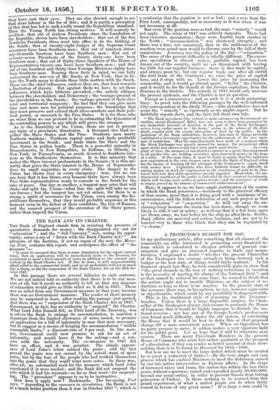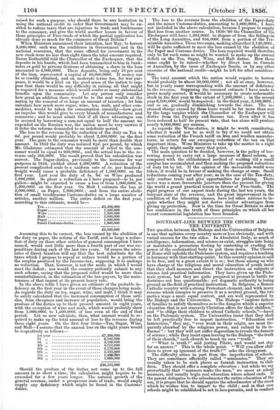A PROJECTOR'S BUDGET FOR 1837.
Ix my preliminary article, after remarking that all classes of the community are alike interested in promoting every financial re- form which is calculated to cheapen articles of general con- sumption and give an increased impulse to trade and manu- factures, I expressed a doubt "whether the present Chancellor of the Exchequer has courage enough to bring forward such a budget as the new state of things would fairly warrant." In his financial speech last May, he took considerable pains to show that "the great obstacle in the way of making reductions in taxation is the necessity of meeting the charge of the National Debt"; and as that cannot be reduced for some time, he seemed to think that the nation ought not to trouble Ministers on the subject of re- ductions as long as there is no surplus. In the present state of the revenue, there was, in his opinion, no tax, however oppressive or objectionable, which could by any possibility be dispensed with.
This is the traditional style of reasoning on the Treasury benches. Unless there is a large disposable surplus, the Chan- cellor of the Exchequer always endeavours to persuade the House of Commons that it would be highly improper to disturb the na- tional revenue ; nor has any of Sir George Lewis's predecessors ever found much difficulty, under the old system, in convincing the House that it would be best to defer this or that proposed change till a more convenient season. When an Opposition has no party purpose to serve, it seldom makes a very vigorous fight for the public good. Let us hope that it will be otherwise next session. There are many Free-trade Members in the present House of Commons who must feel rather qualmish at the prospect of a dissolution, if they can render no better account of their stew- ardship than is to be found in Hansard for 1852-1856. But how are we to meet the large deficit which must be created by so great a reduction of duties ?—By the very simple and easy process which has enabled Ministers to meet the deficiency caused. by our late active intervention in Eastern affairs. In the shape of increased taxes and loans, the nation has within the last three years, without a murmur, raised and expended nearly 80,000,0004 beyond our usual outlay, in order to prevent Russia from taking possession of Turkey. Is there nothing to be learned from this grand experiment, of what a united people can do when fairly roused in favour of any great cause ? If so large a sum could 19
raised for such a purpose, why should there be any hesitation in using the national credit in order that Government may be en- abled to reduce taxes that are injurious to trade and burdensome to the consumer, and give the world another lesson in favour of those principles of Free-trade of which the partial application has already done so much for the commerce of Great Britain?
When Ministers announced their intention, last May, to borrow 5,000,0001. such was the confidence in Government and in the national resources, that the sums offered for investment in the new stock were no less than eight times the total amount required. Baron Rothschild told the Chancellor of the Exchequer, that the deposits in his hands, which had been transmitted to hfin in bank- notes or gold by persons desirous of obtaining a share in the loan amounted to 4,000,000/. These deposits, being only 10 per cent of the loan, represented a capital of 40,000,0001. If money can be so readily obtained, and on moderate terms too, for war pur- poses it would be a libel on the good sense of the nation to sup- pose pur-
poses, there would be any difficulty in raising all that might -be repired for a measure which would confer so many substantial benefits upon the community. Let any person only consider how great an addition there would be to the real wealth of the nation by the removal of so large an amount of taxation ; let him calculate how much more sugar, wine, tea, malt, and other com- modities would be taken for consumption annually—how great an impulse this would give to every branch of manufactures and commerce ; and he must admit that if all these advantages can be secured by borrowing a sum not equal to half the amount we expended on the Russian war, the nation must be very unwise if it defer the reforms demanded to an indefinite period. The loss to the revenue by the reduction of the duty on Tea to 6d. per pound would probably be about 2,500,0001. on the first year. The gain to the consumer would be more than double that amount. In 1853 the duty was reduced 4id. per pound, by which Mr. Gladstone estimated that the amount of relief to the con- sumer would be equal to 950,0001., and the actual loss to the re- venue only 366,000/. The result proved that his calculation was correct. The Sugar-duties, previously to the increase for war purposes in 1854, yielded about 4,300,0001. A reduction of the present complicated scale to a uniform rate of 5s. per hundred- weight would cause a probable deficiency of 1,500,000/. on the first year. Last year the duty of 5s. 661. on Wine produced 1,886,099/. So great a reduction as I have proposed—to is. per gallon—might be expected to cause a loss of from 1,000,000/. to 1,200,0001. on the first year. On Malt I estimate the loss at 2,000,0001. • on Paper, 1,000,0001.; and from the entire aboli- tion of small troublesome Customs-duties on a large number of articles, another million. The entire deficit on the first year, according to this estimate, would be—
Tea
£2,500,000 Sugar 1,500,000 Wine 1,200,000 Malt 2,000,000
Paper 1,000,000 Small Customs-duties 1,000,000 £9,200,000
Assuming this to be correct, the loss caused by the abolition of the duty on paper, the reform of the Tariff, and so large a reduc- tion of duty on those other articles of general consumption I have named, would cost little more than a fourth part of our war ex- penditure during each of the last two years. Of course the advo- cates of direct taxation will say that the best substitute for the taxes which I propose to repeal or reduce would be a portion of the surplus produced by the Income-tax, supposing it to undergo no reduction. That, however, is not the mode in which I would meet the deficit; nor would the country patiently submit to any such scheme, seeing that the proposed relief would be more than counterbalanced, in the estimation of the tax-payers, by the main- tenance of that impost at its present heavy rate. In the above table I have given an estimate of the probable de- ficiency on the first year in the event of those changes being made. As regards the duty on tea, sugar, wine, and malt, I think it may be safely calculated that the increased consumption of those arti- cles from cheapness and increase of population, would bring the produce of the duties up to their present amount in eight years, with the exception of wine and malt, which would probably show from 1,000,000/. to 1,500,000/. of loss even at the end of that period. Let us now calculate, then, what amount would be re- quired to make up the total amount of loss to the revenue during those eight years. On the first four items—Tea, Sugar, Wine, and Malt—I assume that the annual loss on the eight years would be respectively as follows-
1st year
£7,200,000 24 „ 6,105,000 3d" 5,160,000 4th „ 4,115,000 5th „ 3,170,000 6th „ 2,325,000 7th „ 1,480,600 8th „ 1,000,000
£30,555,000
Should the produce of the duties not come up to the full amount in so short a time, the calculation might require to be extended for a few years longer. The natural growth of the general revenue, under a prosperous state of trade, would amply supply any deficiency which might be found in the Customs- duties.
The loss to the revenue from the abolition of the Paper-duty and the minor Customs-duties amounting to 2,000,0001., I have not included in the above calculation, because I propose to supply that loss from another source. In 1859-'60 the Chancellor of the Exchequer will have 1,292,0001. to dispose of from the falling-in of the Long Annuities and 854,0001. from a portion of the Ter- minable Annuities. These two sums making altogether 2,146,0001., will be quite sufficient to meet the loss caused by the abolition of the Paper and Customs duties. The loan required would therefore only be for such sums as might be wanted to make up the annual deficit on the Tea, Sugar, Wine, and Malt duties. How those sums ought to be raised—whether by direct loan in Consols or Annuitiesh by the issue of Exchequer Bonds, or by any other exercise of the national credit-raight be left for after considera- tion.
The total amount which the nation would require to borrow would probably be about 30,000,0001.; not all at once, however, but in yearly sums Oorresponding with the amount of deficiency in the revenue. Supposing the assumed estimate I have made to prove nearly correct, it 'would be necessary to create redeemable stock in the first year to the extent of 7,200,0001.; in the second year 6,100,0001. would be required ; in the third year, 5,160,0001.; and so on, gradually diminishing towards the close. The in- creased charge caused by these loans would be far more than met by the large surplus which the Chancellor of the Exchequer will derive from the Property and Income tax. Even after it has been reduced to half its present rate, that tax alone will produce nearly 8,000,000/. per annum. As regards the Wine-duties, it might be worth considering, whether it would not be as well to 'fry if we could not obtain some reduction of the French tariff on iron and woollen manufac- tures in return for our sweeping reduction of the tax on that important item. We're Ministers to take up the matter in a right spirit, they might easily carry that point.
The main question to be decided, however, is the policy of bor- rowing money to carry out a large measure of fiscal reform as compared with the oldfashioned method of waiting till a a:nail s us has accumulated and then making the proposed reductions of duty bit by bit. If the opinion of the mercantile world were taken, it would be in favour of making the change at once. Small reductions coming year after year, as in the case of the Tea-duty, only confuse trade and give opportunities for jobbing. There never was a more favourable juncture than the present for giving the world a grand practical lesson in favour of Frei3-trade. The rapid progress of our export trade during the last ten years, the buoyant state of the revenue, and the great improvement in the condition of the labouring classes, have led other nations to in- quire whether they might not derive similar advantages from giving up protection. Now is the time for Great Britain to show her confidence in the truth of those principles on which all her recent commercial legislation has been founded.



























 Previous page
Previous page